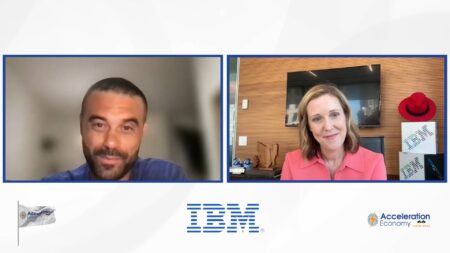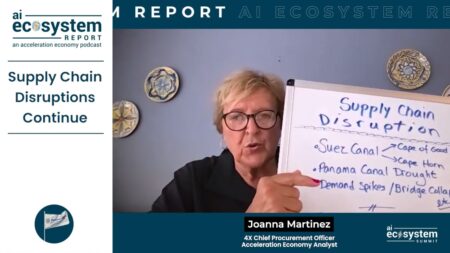From hybrid cloud to large language models, IBM’s CEO charts a path of optimism, growth, and client-centric transformation in a dynamic global landscape.
Search Results: procurement (328)
SAP Business Network enables companies to transform their supply chains into strategic assets that enhance customer relationships.
AI agents are quickly emerging to address vertical and horizontal use cases; they also hold great potential as productivity boosters in fast-moving startups.
The SAP Business Network enables businesses to enhance customer experiences by streamlining supply chains, leveraging technology, and driving continuous improvement despite challenges.
Connectors let customers tap multimodal AI models created with Amazon Bedrock on the Service Now platform, speeding development of GenAI-driven products.
The SAP Business Network drives bold, customer-centric supply chain transformation, facilitating $6 trillion in transactions over the past year while delivering efficiency, visibility, and superior customer experiences.
UiPath’s Bobby Patrick joins Cloud Wars analysts for a roundtable discussion on his company’s next phase of growth focused on agentic automation, which helps customers automate complex workflows.
With bold plans for $30B in revenue, ServiceNow’s Bill McDermott pushes AI-driven growth through Now Assist, Raptor DB, and Customer Workflows, redefining digital transformation.
SAP’s increasingly modular cloud ERP suite, covering financials and supply chain, is saw a 33% growth rate in Q2, which is expected to continue in Q3.
As demand planners face ongoing disruptions, copilot technology can assist with enhanced visibility, understanding of a wide set of variables, and robust forecasting.
SAP’s new AI agents will improve productivity by collaborating across business functions — along with its Joule AI assistant — to handle complex workflows.
Top cloud vendors are deploying advanced AI agents to automate business processes and enhance human potential by handling low-value tasks, with Salesforce and Oracle leading the “Agent Wars” through 2025.
With a wave of new and enhanced features in the Now Platform, plus a stepped up focus on the use of partners, ServiceNow is positioning itself as the AI Platform for Business Transformation.
Organizations must thoroughly plan, budget, and evaluate key considerations before transitioning from on-premise to the cloud.
Kate Woolley of IBM explains how co-creation and AI-cloud integration are key to driving innovation and meeting customer needs.
With the rapid rise of AI, lawmakers are turning their attention to developing AI regulations and legislation to mitigate risks while protecting business and consumers.
The world isn’t quite past the supply chain disruptions of recent years, but there are tangible steps that leaders can take to mitigate their effects when planning for 2025.
Microsoft is removing the GPT Builder feature from Copilot Pro, which may impact users and shift its focus towards broader commercial and enterprise markets.
With a squarely enterprise-focused business model and an AI product set to serve enterprise requirements, Cohere has staked out a distinctive position in the AI ecosystem.
Celonis adds new AI functionality to its Process Intelligence Graph and makes it easier to integrate with customers’ data platforms and systems of record.





















